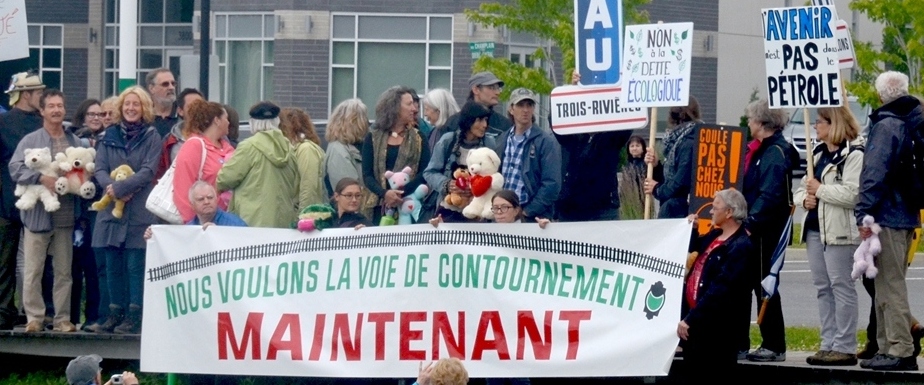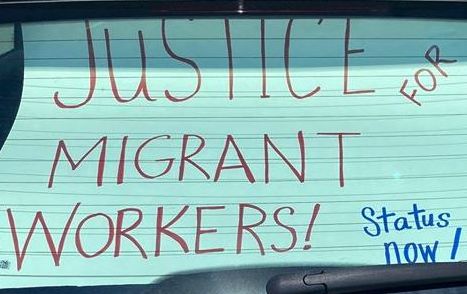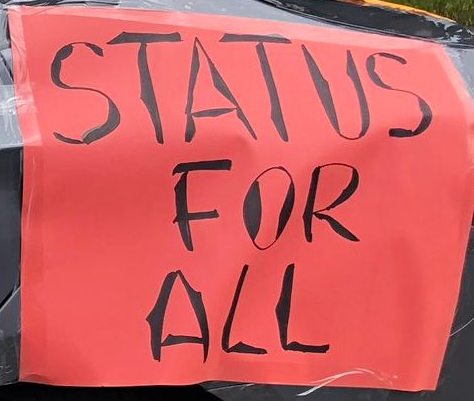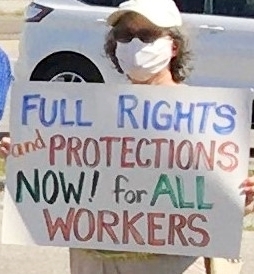|
December 15, 2021 - No. 120
Lac-Mégantic Tragedy: Where Are We Eight Years Later?
Join the Discussion! 
Status for All! Social Programs for All!
• Migrant Workers Demand Full Access to Employment Insurance Benefits
Lac-Mégantic Tragedy: Where Are We Eight Years Later?

Wednesday,
December 15 - 7:00 pm ET
Montreal
1360 Ontario St. E.,
To reserve a seat: 514-522-5872
If attending
in person masks, social distancing and proof
of vaccine passport is required.
Join on Zoom
To participate via Zoom click here.
Simultaneous translation into
English
This evening, at 7:00 pm ET, Robert Bellefleur, spokesperson for the
Coalition of Citizens and Organizations Committed to Railway Safety in
Lac-Mégantic, and Anne-Marie Saint-Cerny, author of the book
"Mégantic" and the comic strip "Mégantic, un train dans
la nuit" will be speaking at a public meeting in Montreal. Participants
from
across the country can join via Zoom. The meeting is in support of the
fight of the community of Lac-Mégantic for its safety and for
rail safety for all communities in Quebec and Canada.
The Lac-Mégantic tragedy is one of the most devastating rail
tragedies in Canadian history. In the early hours of July 6, 2013, a
train with cars filled with highly flammable oil -- falsely labeled as
lightly flammable -- transported in tank cars that were not appropriate
for such hazardous material, on rail tracks that were not properly
maintained, rolled downhill, derailed and exploded in downtown
Lac-Mégantic, causing the death of 47 people, serious injuries
to numerous others, severe post-traumatic stress for the population and
very extensive property damage.
Important information is going to be presented on what caused the
tragedy and on the fight to make sure that people put an end to these
tragedies.
All are invited to listen to the presentations and take part in the conversation.

Status for All! Social Programs for All!
 
In a November 28 letter to Prime Minister Trudeau and several Cabinet
Ministers, Justicia for Migrant Workers (J4MW) demands full access to
Employment Insurance (EI) benefits for migrant workers and to all
social programs and public services in existence in Canada. It also
reiterates the demand for permanent status for migrant workers
on arrival in Canada.
 On the issue of EI, the letter points out that since 1966, workers
employed through the Seasonal Agricultural Worker Program (SAWP) have
contributed millions of dollars to the EI regime but have been denied
access to it as a result of their tied work permits. Tens of thousands
of migrant workers come to Canada every year from a dozen
countries to work on Canadian farms and in greenhouses through which
they are tied to a single employer and denied options to change jobs.
They pay into EI through payroll deductions but are ineligible for
Employment Insurance if they lose that job. They are denied EI benefits
if the job to which they are tied ends, as they are then deemed "not
available for work" because they are bound to that one employer, even
when that employer cannot or will not employ them. Workers who have
lost or lose their employment as a result of the pandemic, crop loss or
environmental crises can be terminated and repatriated because of the
conditions related to their work permit. As well, most seasonal
workers do not qualify for special EI benefits, including maternity,
parental, sickness or compassionate leave. On the issue of EI, the letter points out that since 1966, workers
employed through the Seasonal Agricultural Worker Program (SAWP) have
contributed millions of dollars to the EI regime but have been denied
access to it as a result of their tied work permits. Tens of thousands
of migrant workers come to Canada every year from a dozen
countries to work on Canadian farms and in greenhouses through which
they are tied to a single employer and denied options to change jobs.
They pay into EI through payroll deductions but are ineligible for
Employment Insurance if they lose that job. They are denied EI benefits
if the job to which they are tied ends, as they are then deemed "not
available for work" because they are bound to that one employer, even
when that employer cannot or will not employ them. Workers who have
lost or lose their employment as a result of the pandemic, crop loss or
environmental crises can be terminated and repatriated because of the
conditions related to their work permit. As well, most seasonal
workers do not qualify for special EI benefits, including maternity,
parental, sickness or compassionate leave.
The letter states, in part:
"With
respect to access to regular EI benefits, migrants face multiple
barriers. We have seen this with the ongoing pandemic and closure of
multiple workplaces, but workers are also impacted by climate change.
Pre-pandemic, agricultural migrants have been terminated and
repatriated because of crop loss attributed to environmental or direct
human factors. The current climate disaster in British Columbia is only
the latest salvo in an ongoing devastating environmental disaster that
has disproportionately impacted vulnerable communities.
"Migrant farm workers have experienced the impact of climate change
both in their home country and currently here in Canada. In 2017, for
example, migrant farm workers from Dominica were stranded in Canada as
a result of the devastation that was inflicted on the island from
Hurricane Maria. No policies existed then or now to support this
group of workers. Advocacy groups wrote to the federal government to
develop immediate steps to address this failure of the government to
assist in this prior crisis, but their calls for action to prevent
climate racism were met with silence.
"This past season's fires, extreme heat, and now flooding have
created significant obstacles for the agricultural industry. While both
provincial and federal governments have developed support mechanisms to
assist the industry, still no steps have been taken to support the
industry's workers. It is essential that the federal government develop
proactive measures not piecemeal efforts to address the long term
consequences of pandemics, economic uncertainty, and climate change.
Short-term relief will not address systemic policy failures. Climate
and economic injustice are intertwined both for migrants here and their
home countries. Current EI policies undermine migrants' access to
income support. These issues will only heighten as climate disasters
become more frequent and severe."
 Justicia presents a series of demands to provide justice to migrant
workers. They include permanent status on arrival; no reprisals,
repatriation or disbarment of migrant workers for exerting their
rights; ensuring migrant and non-status workers have access to EI
benefits; immediately changing closed work permits to open permits so
that workers
stop being trapped in untenable situations; reversing all decisions
that denied regular EI benefits to migrant workers and providing full
special benefits to them, and many others. Justicia presents a series of demands to provide justice to migrant
workers. They include permanent status on arrival; no reprisals,
repatriation or disbarment of migrant workers for exerting their
rights; ensuring migrant and non-status workers have access to EI
benefits; immediately changing closed work permits to open permits so
that workers
stop being trapped in untenable situations; reversing all decisions
that denied regular EI benefits to migrant workers and providing full
special benefits to them, and many others.
Workers' Forum fully supports these demands for justice for
migrant workers. Migrant workers are part of the Canadian working class
which does not recognize the categories that the ruling elite has
created in an attempt to divide people. This division is used to
justify the super-exploitation of those accorded fewer rights. Modern
definitions recognize only one humanity and governments at every level
have a duty to guarantee the rights of all.
To read J4MW's full letter, click here. 
(To access articles individually click on the black headline.)
PDF
PREVIOUS
ISSUES | HOME
Website: www.cpcml.ca
Email: office@cpcml.ca
|

